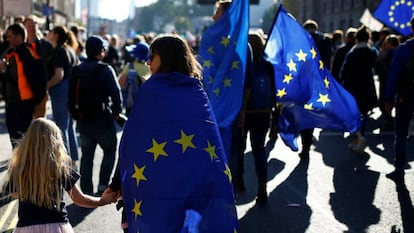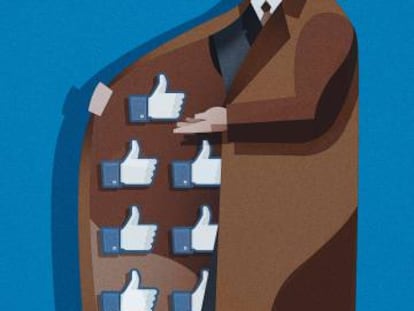The European Union: More united than ever
Divisions exist, and they are serious, but a calm and collected analysis, with historical perspective, shows a much better situation

The notion that the European Union has never been less united than now has taken hold in the public consciousness. The recurring theme is that EU countries are unable to agree on euro reforms, on migratory flow management, on how to deal with growing aggressiveness from the US, Russia and China, and that the rise of national populism will further undermine the Union to the breaking point.
The national populists no longer want to destroy the EU, they want to make it more authoritarian instead
Divisions exist, and they are serious, but a calm and collected analysis, with historical perspective, shows that Europe is probably more united today than ever before. And to convince ourselves of this fact, it is not necessary to recall the centuries¡¯ worth of European conflicts ranging from the Hundred Years¡¯ War to World War II. It is enough to review the last 60 years of European integration.
Let¡¯s break it down into decades. In the 1960s we had the Empty Chair Crisis, triggered by a De Gaulle, who felt considerably more French than European. Then, in the 1970s, we had the collapse of the ¡°snake in the tunnel¡± (an attempt at monetary cooperation) that buried the Werner Plan and triggered years of tensions between France and a dominant Germany, which imposed the tyranny of the Deutsche Mark. And in the 1980s we had the crisis of Thatcher¡¯s ¡°handbag¡± and the Fontainebleau agreement institutionalizing the rebate for the UK on its contribution to the EU budget, a historical mistake that firmly established ¡°English exceptionalism.¡±
There are those who will think that the 1990s, with the fall of the Berlin Wall and the signing of the Maastricht Treaty, were years of greater unity. Not in the least. The United Kingdom did not join the euro, the Danish voted against it, and only 51% of French citizens supported it. It was a narrow victory, and meanwhile there were many voices opposed to extending EU membership to Eastern European countries. These tensions flared up again in the first decade of the 21st century when the French and the Dutch voted against the European Constitution.
Juncker flew to Washington DC and negotiated a truce with US President Trump on equal footing, as a representative of the interests of 500 million Europeans
These episodes might seem trivial compared with the dramatic events of 2012 and above all 2015, when Greece was nearly kicked out of the euro club. But this, too, needs to be seen in perspective. If European leaders spent decades negotiating tooth and claw EU budgets that never exceeded 1% of GDP, and which now stands at around €150 billion, how could they be expected not to confront one another, and even exchange insults, when the total figure for the Greek bailout was €290 billion? That¡¯s higher than Denmark¡¯s entire GDP!
In fact the EU, which now has 27 member states instead of just 12, is doing better than expected. When future historians analyze the tug-of-war between the UK and the EU over Brexit, they will conclude that the Union remained united and secured a separation agreement that proved beneficial to its own interests. They will also underscore that this is the first time in 500 years that Britain has not managed to divide the continent, even though it has certainly tried, even resorting to the argument of its military might.
This is the first time in 500 years that Britain has not managed to divide the continent
The Union has also remained united throughout tensions with Russia, the US and China. There have been nearly five years of seamless sanctions against Russia, a feat that few thought possible. And recently, European Commission President Jean-Claude Juncker flew to Washington DC and negotiated a truce with US President Trump on equal footing, as a representative of the interests of 500 million Europeans. This in itself is an unprecedented event. In its relations with China, the EU has surprised even the more optimistic observers, first by not granting the Asian giant market economy status in the World Trade Organization, and later by establishing the first oversight mechanism for European investment, an idea that prompted derisive laughter from American diplomats just a few years ago.
Even popular support for the EU has increased. Figures from the 2018 Eurobarometer show that two thirds of citizens (67%) support the EU, an unseen number since 1983, while 74% support the single currency, a new record. As a matter of fact the Union is so attractive that 700,000 British citizens recently marched on the streets of London waving European flags (a seemingly impossible sight), while French President Emmanuel Macron drapes himself in the European flag on a daily basis (pure madness) and German Chancellor Angela Merkel wants to create a European army (reckless).
And the most extraordinary part of all is that neither Hungary¡¯s Viktor Orb¨¢n, nor Poland¡¯s Jaroslaw Kaczynski, not even Italy¡¯s Matteo Salvini actually defend leaving the Union. On the contrary, they are contemplating a League of Leagues to take Brussels by storm. This may sound scary, but this structural change is positive. The national populists no longer want to destroy the EU, they want to make it more authoritarian instead. What is being created is a European demos with all its inherent ideological battles. This is so much so, that for the first time the European elections of next May will be truly European elections. Those who do not wish to see an authoritarian EU should go out and vote. And here¡¯s the biggest irony of all: maybe the British will have regrets and join the party of European democracy after all.
Miguel Otero Iglesias is a Senior Analyst at Real Instituto Elcano and a professor of practice at Instituto de Empresa¡¯s School of Global and Public Affairs.
English version by Susana Urra.
Tu suscripci¨®n se est¨¢ usando en otro dispositivo
?Quieres a?adir otro usuario a tu suscripci¨®n?
Si contin¨²as leyendo en este dispositivo, no se podr¨¢ leer en el otro.
FlechaTu suscripci¨®n se est¨¢ usando en otro dispositivo y solo puedes acceder a EL PA?S desde un dispositivo a la vez.
Si quieres compartir tu cuenta, cambia tu suscripci¨®n a la modalidad Premium, as¨ª podr¨¢s a?adir otro usuario. Cada uno acceder¨¢ con su propia cuenta de email, lo que os permitir¨¢ personalizar vuestra experiencia en EL PA?S.
?Tienes una suscripci¨®n de empresa? Accede aqu¨ª para contratar m¨¢s cuentas.
En el caso de no saber qui¨¦n est¨¢ usando tu cuenta, te recomendamos cambiar tu contrase?a aqu¨ª.
Si decides continuar compartiendo tu cuenta, este mensaje se mostrar¨¢ en tu dispositivo y en el de la otra persona que est¨¢ usando tu cuenta de forma indefinida, afectando a tu experiencia de lectura. Puedes consultar aqu¨ª los t¨¦rminos y condiciones de la suscripci¨®n digital.











































